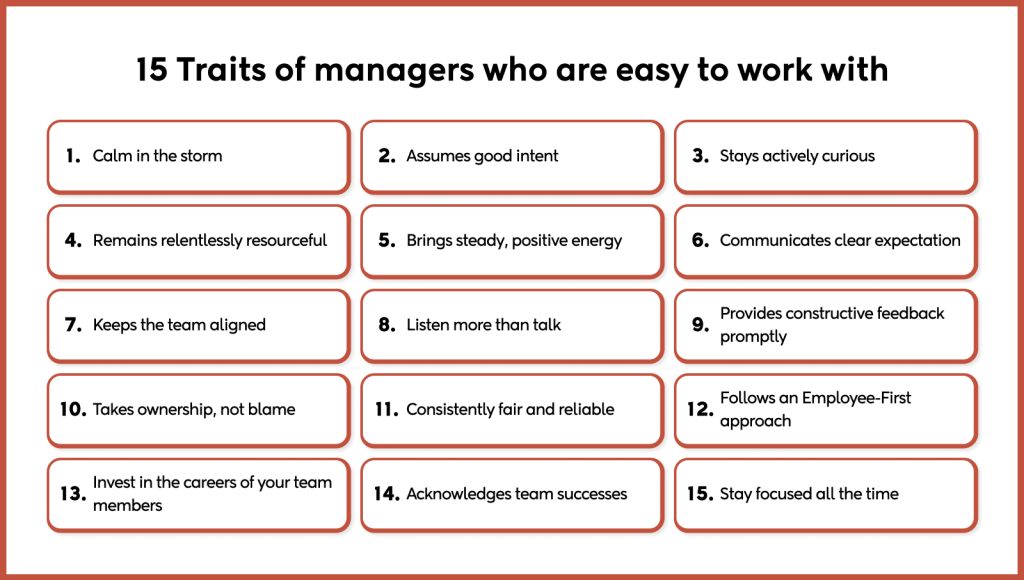Why do some managers inspire loyalty and enthusiasm, while others struggle to keep their teams engaged? The difference rarely lies in job titles or authority—it’s in the habits they practice every day. Habits shape how you lead, how your team responds, and ultimately, how successful you become as a manager.
As a new manager, you want to lead effectively, earn your team’s respect, and deliver results—but knowing exactly what to do isn’t always obvious. Focusing on the right habits makes all the difference. When you communicate clearly, stay calm under pressure, take ownership instead of blaming others, and listen more than you speak, you go beyond typical ‘soft skills.’ These habits transform you into a manager your team enjoys working with rather than just tolerating.
Here are 15 habits that set apart managers people truly love working with.
15 Traits of managers who are easy to work with

To help you lead effectively and earn your team’s trust, here is a list of daily habits that make you a highly effective manager.
1. Calm in the storm
Teams often mirror their leader’s energy. A panicked manager creates panic in others, while a calm one inspires confidence, resilience, and problem-solving. Taking a moment before responding to bad news, speaking in a steady tone, and guiding the team toward solutions instead of dwelling on problems are some of the tendencies that make them an easy-to-work-with manager.
Use breathing techniques to center yourself before responding, create short pauses in meetings to reset the tone, and practice reframing setbacks as temporary hurdles instead of permanent problems.
2. Assumes good intent
Managers who are easy to work with give their team the benefit of the doubt. They assume colleagues mean well and seek understanding before reacting. This builds trust, encourages open communication, and makes team members feel secure in sharing ideas or raising concerns.
This approach fosters trust, making team members feel secure in sharing ideas, asking questions, and raising concerns, as they know their manager has their back.
Before jumping to conclusions, pause and ask clarifying questions. For example, if an email seems short or unclear, check in with the sender to understand their intent instead of assuming criticism.
3. Stays actively curious
Managers who are easy to work with stay curious. They explore different perspectives and actively seek knowledge before making judgments. They understand that assumptions can lead to poor decisions, so they prioritize learning and understanding before taking action.
Leaders who continuously seek to understand new trends, strategies, and ideas keep their organizations ahead of the curve. They don’t settle for “how things have always been done” but instead push boundaries and encourage teams to think critically.
To add to your habit list, regularly ask open-ended questions in meetings, invite team members’ viewpoints, and dedicate time each week to learning something new in your area of expertise.
4. Remains relentlessly resourceful
Easy-to-work-with managers don’t get stuck when challenges arise. They approach obstacles with determination, asking, “What else can I try?” instead of dwelling on why something is difficult. These managers see problems as opportunities to innovate, inspiring their team to do the same. Their persistence and creativity turn challenges into learning experiences.
When a problem arises, pause, explore multiple solutions, and take initiative to act—show your team that challenges are opportunities, not dead ends.
5. Brings steady, positive energy
Workplaces can be stressful, but great leaders bring a steady sense of optimism. Instead of feeding negativity, they create an environment where positive energy thrives and consistently look for ways to motivate team members to stay engaged and inspired. They bring enthusiasm, encourage creativity, and make the team feel valued, capable, and excited about their work.
To foster such positivity, you should inspire confidence, even when facing difficulties and turning obstacles into opportunities for growth.
6. Communicates clear expectations
Successful managers are good communicators. They make roles and goals crystal clear so no one feels lost or confused. This not only prevents misunderstandings but also builds confidence within the team as everyone knows what’s expected of them.
Always put expectations in writing, whether it’s through project briefs, meeting notes, or team collaboration software, and follow up by asking team members to confirm their understanding. This keeps everyone informed and reinforces a shared understanding of the organizational goal.
7. Keeps the team aligned
Managers who are easy to work with make sure their team is always focused on the right priorities. They clearly communicate goals, deadlines, and responsibilities so everyone knows what matters most and what to tackle first. By keeping the team aligned, they prevent confusion, duplication of effort, or wasted time on low-priority tasks.
Utilize project management tools like ProofHub, conduct regular check-ins, or provide brief status updates to keep everyone aligned and ensure consistency in goals and priorities.
8. Listen more than talk
Great managers know that active listening means prioritizing what others have to say and showing genuine interest in their perspectives. This habit allows managers to truly understand team dynamics, individual strengths, and challenges—key ingredients for effective leadership and decision-making.
As Larry King once said, “I remind myself every morning: Nothing I say this day will teach me anything. So if I’m going to learn, I must do it by listening.” This perfectly captures why listening matters more than talking.
Focus fully on the speaker, avoid interruptions, and show you are present with eye contact and nods. Ask open-ended questions to encourage sharing, and reflect on what you hear before responding to show you value their input.
9. Provides constructive feedback promptly
Managers who are easy to work with give feedback thoughtfully and with the intention to help employees improve rather than discourage them. They understand that feedback is a two-way street and actively contribute to the professional growth of their team members. High-performing managers take the time to ensure their feedback is meaningful, clear, and actionable.
Be specific by providing examples, balance praise with areas for improvement, and encourage dialogue to ensure understanding. Make feedback a regular habit to foster continuous learning and collaboration.
10. Takes ownership, not blame
Mistakes happen to everyone, but managers who are easy to work with don’t waste time making excuses or pointing fingers. Instead, they admit when something goes wrong, take responsibility, quickly focus on solutions, and shield the team instead of pointing fingers. By owning mistakes openly, these managers create a safe environment where employees don’t fear being judged for slip-ups.
Just like a great manager, when a mistake happens, acknowledge it upfront, share what you’ve learned, and show the team how you’ll fix it moving forward.
11. Consistently fair and reliable
Great managers make decisions that are fair and dependable. They treat everyone on the team equally and follow through on their promises, so employees know what to expect. This consistency builds trust because team members feel confident that rules, expectations, and rewards are applied evenly.
Be consistent in your actions and decisions, communicate openly about expectations, and follow through on commitments to build trust and credibility with your team.
12. Follows an Employee-First approach
A great habit of managers is that they remember that their team members are human beings beyond numbers and performance metrics. They prioritize employees over deadlines and create an environment of growth and improvement beyond just meeting deadlines and workplace pressure.
Take time to check in with team members and personally show empathy when challenges arise, and recognize their efforts beyond just performance metrics. Make decisions that consider team members ‘ well-being alongside business goals.
13. Invest in the careers of your team members
The habit of high-performing managers is to facilitate their team members to keep learning and growing. They create an environment within the team or organization where continuous learning is valued, encouraged, and embedded in the team’s habits.
You can also invest in team career advancement by providing access to training programs, workshops, learning resources, and giving team members opportunities to take on challenging projects that stretch their skills—all of which contribute to building high-performing teams. They also lead by example, showing curiosity, embracing new ideas, and reflecting on lessons learned from successes and failures.
14. Acknowledges team successes
Great managers make it a habit to celebrate achievements in ways that boost morale and strengthen team bonds. They recognize and praise accomplishments in the moment, whether it’s a small milestone or a major project, making employees feel valued and appreciated. They also celebrate “up the chain” by sharing exceptional performance with senior leaders, giving team members well-deserved credit, and creating memorable moments of recognition.
Make recognition a regular habit—praise achievements immediately, share successes with higher-ups, and occasionally celebrate personal milestones to build strong, meaningful connections.
15. Stay focused all the time
Great managers know how to stay focused and help their teams do the same. Instead of getting lost in distractions or trying to juggle too many things at once, they keep their eyes on the priorities and make sure the team is moving in the right direction.
Art the day or week by highlighting the most important tasks and making sure everyone knows what matters most. Additionally, turn off non-essential notifications, block out quiet work time, and let the team know when you’re available.
Conclusion
Embracing these 15 habits not only enhances individual performance but also cultivates a culture of excellence and continuous improvement within the team. When managers consistently practice these behaviors, they set the tone for accountability, trust, and growth. Over time, these habits create stronger relationships, higher engagement, and a resilient team that can adapt to any challenge.






















No Comments